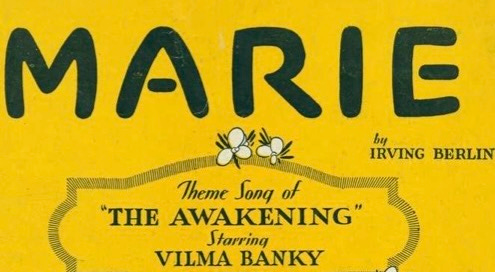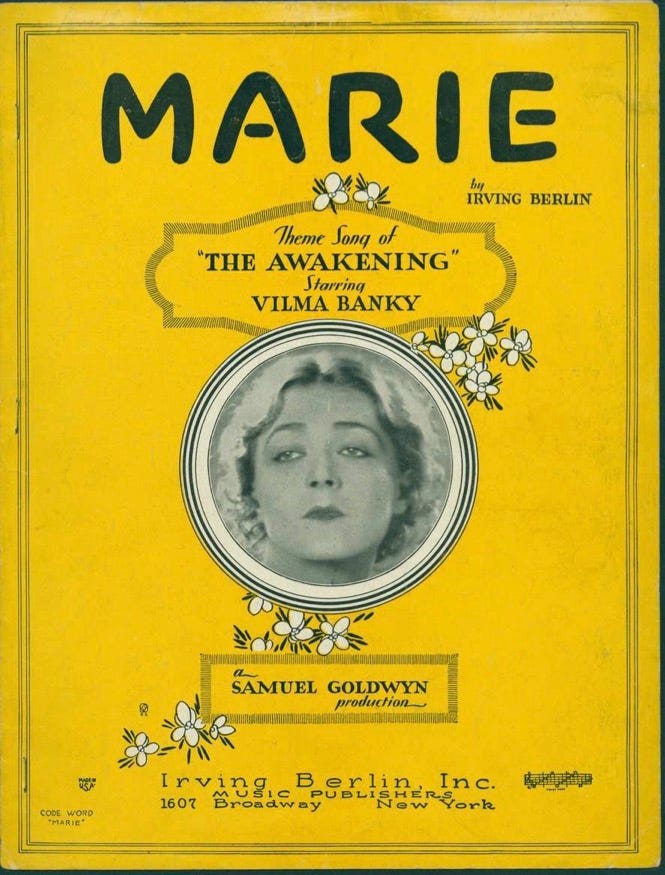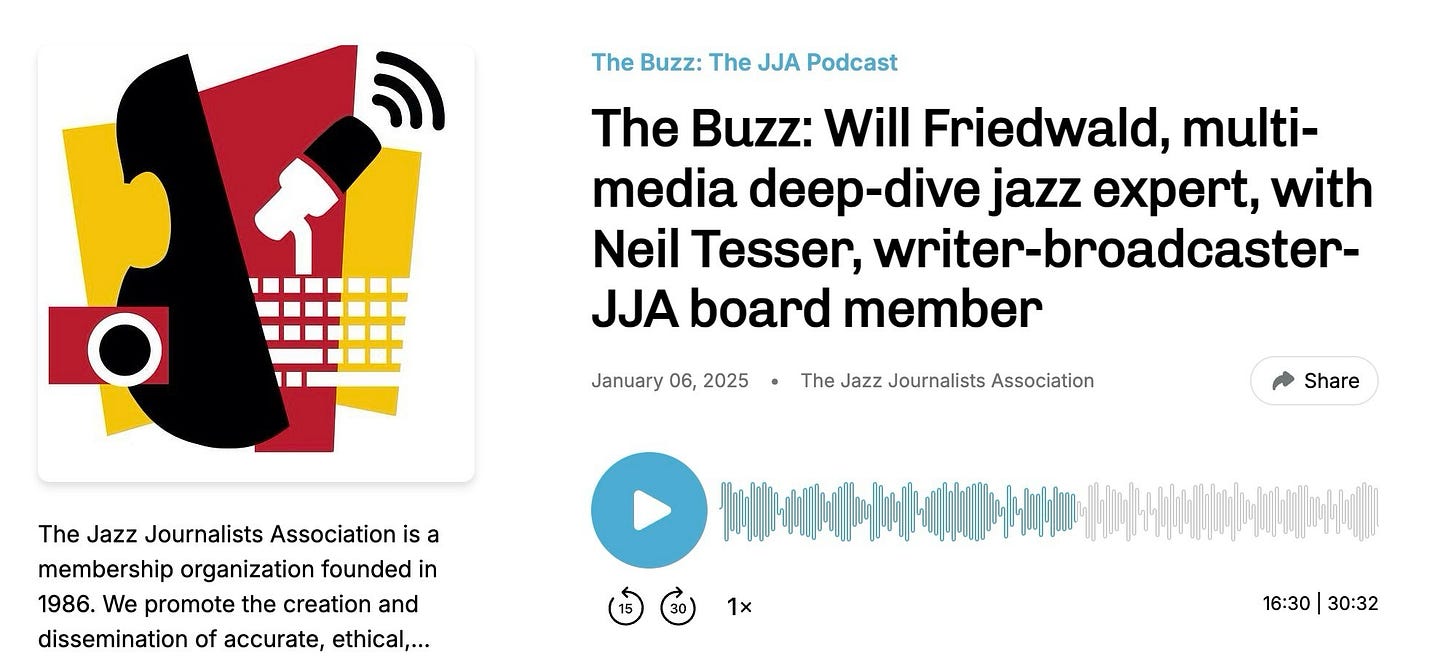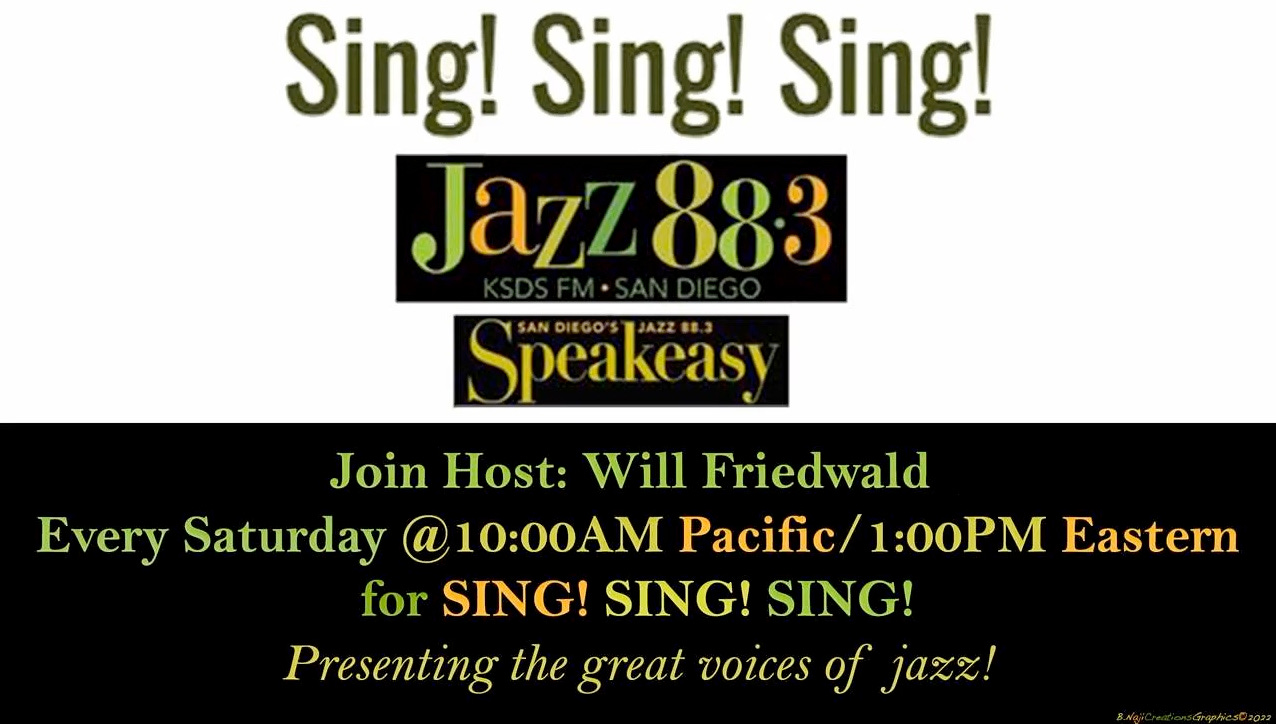Sinatra! Tommy Dorsey! Irving Berlin! “Marie” (Part 3): More Variations
Spoken As It Came From Me: The strange but swinging afterlife of Irving Berlin’s first movie song.
EDDIE SOUTH AND HIS ORCHESTRA
prob. Hilversum, The Netherlands, March, 1938
Vocal by Mabel Mercer and Band
Yes, this is Mabel Mercer, who would go on to become a major influence on Sinatra, Bennett, and practically everyone else who ever sang the Great American Songbook, working with one of the great jazz violinists there ever was; a Black British singer and an African American musician together in Holland before the war. Of all the “Marie” variations we’ve been sampling, this one is, remarkably, the most direct “cover” of the Tommy Dorsey hit arrangement. The major difference is that South, who was frequently billed as “The Dark Angel of the Violin” takes the major solo after the vocal, rather than the familiar triptych of trumpet, tenor, and trombone. Thanks to the indefatigable Anthony Barnett, the world’s premiere scholar of jazz violin, for finding this broadcast transcription, which was issued in the CD era on the Dutch label Timeless, Americans in Holland ~ The Great Thirties Vol. 1.
FATS WALLER AND HIS RHYTHM (plus orchestra)
New York, March 11, 1938
The song was so enormously popular that Fats Waller soon got into the act, and was playing it on the road and the radio at least as early as fall 1937. In March of 1938, he recorded a hard-swinging but highly curious performance of his arrangement of “Marie,” in which his six- or seven-piece combination, billed as “His Rhythm,” was augmented by a full-sized big band. No one knows who they were or why they were there - the track was marked “test for (RCA executive) Eli Oberstein” - and it wasn’t released until many years after Waller’s tragically early death at 39 in 1943. However, it is exciting, and we do know that Fats also performed the song on a broadcast from London in October 1938.
TENDERLEAF TEA PRESENTS THE TOMMY DORSEY SHOW
August 26, 1946
Mashup: “Solitude / Marie”
Trombone Solo: Tommy Dorsey
Piano Solo: Duke Ellington
This will probably be the topic of a future SubStack: in May 1945, Duke Ellington and Tommy Dorsey executed a famous switch hit deal, in which they each soloed with the other’s orchestra - this being at a time when both were under exclusive contract to RCA Victor. What’s less known is that more than a year later, Ellington made a guest appearance on Dorsey’s radio show. I’m going to post the whole thing here at some point, but the “mash-up” as the kids say, of Ellington’s classic “Solitude” and Dorsey’s classic “Marie” is a once-in-a-lifetime occurrence - and that’s probably a good thing! You will hear Dorsey’s orchestra playing the melody to “Solitude,” with Dorsey in the lead role, serving both as himself and the Jack Leonard/Sinatra stand in, with the band chanting the “Marie” response chorus; soon Ellington himself steps in and plays a more serious chorus backed by the Dorsey Orchestra.
PHILLIP MORRIS PRESENTS RUDY VALLÉE
September 17, 1946
Special guests: Tommy Dorsey, “The Sentimental Gentleman of Swing” and Bert Gordon, “The Madman from Minsk”
While there are no accurate hit record sales charts prior to 1940 - and the first #1 tune on the first actual Billboard chart was, in fact, “I’ll Never Smile Again” by Tommy Dorsey and Frank Sinatra - it’s generally agreed that the most successful recording of “Marie” during its original run in 1928-1929 was by Rudy Vallée and his Connecticut Yankees. One can only wonder what Vallée, who was known for his fondness for a buck, was thinking when Tommy Dorsey and his crew struck gold with the selfsame Irving Berlin ballad seven years later. This is actually a fun little duo; both TD and Vallée are nothing if not game. If you listen longer, you’ll hear Vallée - playing his alto saxophone, yet - and Dorsey dueting on the vaudeville standard, “Mr. Gallagher and Mr. Sheen.” If you go back to the beginning, you’ll hear Vallée matching wits with the popular radio comic Bert “The Mad Russian” Gordon.
THE KATE SMITH HOUR
November 7, 1951
Vocal: Bob London
Tenor Saxophone Solo: Sam Donohue
Also visible in the trumpet section: Charlie Shavers
This is a particularly zesty version of “Marie” that shows TD and company never stopped paying homage to that great gal over the entire life of the band, even 15 years after 1936 when they first started playing it. At this point, it was considered daring to show Black and white musicians performing together on television, and yet Dorsey and the show’s producers (and presumably also Kate Smith herself) have no reservations about giving plenty of close-ups to Dorsey’s star trumpeter, Charlie Shavers. He can be seen clearly playing with the section, though ironically he doesn’t actually solo since all four trumpets are playing the transcribed / expanded version of Bunny Berigan’s original 1937 chorus. (Thanks to Burton Kittay and Mark Cantor for this clip.)
THE JACKIE GLEASON SHOW (“THE HONEYMOONERS”)
December 26, 1952
Vocal (and trumpet): Johnny Amoroso
Alto saxophone solo: Jimmy Dorsey
There are two extant television performances of Dorsey playing “Marie,” both of which occur on the programs of a pair of literal larger-than-life TV stars, Kate Smith and Jackie Gleason. This extended sketch, later marketed as one of the Honeymooners so called “Lost Episodes” represents the beginning of Gleason’s fortuitous relationship with the Dorsey Brothers, culminating in several seasons of Stage Show, a Gleason-produced variety series that starred the two Dorsey brothers. That series would, in 1956, provide the vehicle for Elvis Presley’s television debut; that’s right - the man who did more than anyone else to make Frank Sinatra a star in 1940-’42 would, 15 years later, do the same for Elvis.
Featured singer Johnny Amoroso was a particularly inspired trumpeter who doubled on vocals over roughly five years with Dorsey starting in 1950, and continuing through the period in which Tommy’s older brother, Jimmy Dorsey, was absorbed back into the band. He sings wonderfully, almost more reminiscent of Dean Martin than Sinatra, on a number of commercial 78s by the band and also numerous radio transcriptions. I prize this performance all the more fondly because at one point around 2010, a very young-looking but probably 75-year-old Johnny Amoroso walked into Sofia’s, in the basement of the Edison Hotel, and sat in with Vince Giordano and the Nighthawks - singing and playing “Marie,” of course. He both looked and sounded great!
The 1954 Bell Records Recording
New York, January 1954
Vocal by Gordon Polk
Alto Saxophone solo: Jimmy Dorsey
Music business entrepreneur Arthur Shimkin founded Bell Records in 1952, and his business model was to offer cheaper “cover” versions of famous hits. He must have lured Tommy and Jimmy Dorsey to the label by offering a larger percentage for a royalty than RCA Victor or Decca were willing to give them - but then again, in 1954, the Dorseys had far fewer options than they’d had just a few years earlier. As it happened, Bell Records wouldn’t remain a minor league player for all of its existence; the infamous Clive Davis would later re-fashion the remnants of Bell into a new label now called Arista Records.
Arthur told me the story roughly 50 years later: In 1954, Shimkin asked Dorsey to record a new version of the band’s classic arrangement of “Marie,” this time with Gordon Polk singing the lead vocal. As a courtesy to the composer, Shimkin sent a copy of the disc to Irving Berlin’s office. He was then surprised to receive an irate phone call from none other than the Great Man himself, of which the gist was, and I quote, “You tell that Irish bastard not to mess with my song!” (And no, “mess” was not the actual word that he used.) When Arthur called TD and perhaps made the mistake of informing him of the songwriter’s reaction, his own response was, “You tell that Jew bastard that if I hadn’t messed with it, there wouldn’t be any song!” (And he didn’t use that word “mess” either.) Meaning that if Dorsey hadn’t used the Doc Wheeler Sunset Royals arrangement, then “Marie” would have been completely forgotten.
What can we say to end this series, other than, “Livin’ in a great big way - Mama!”
The Buzz! (Jazz Journalists Association)
Neal Tesser interviews Will Friedwald
Listen here.
Sing! Sing! Sing! : My tagline is, “Celebrating the great jazz - and jazz-adjacent - singers, as well as the composers, lyricists, arrangers, soloists, and sidemen, who help to make them great.”
A production of KSDS heard Saturdays at 10:00 AM Pacific; 1:00PM Eastern.
To listen to KSDS via the internet (current and recent shows are available for streaming.) click here.
The whole series is also listenable on Podbean.com; click here.
SING! SING! SING!
Salute to Fruit, Part 1 - Stealin' Apples
(SSS #131 2025-01-18)
download: or play online:
Get Happy! The Harold Arlen-Ted Koehler Songbook
(SSS #130 2025-01-11)
Download: <or> play online:
The Buzz! (Jazz Journalists Association)
Neal Tesser interviews Will Friedwald
Listen here.
Let's Have a Party! NEW YEAR’S PARTY SPECIAL
(SSS #129 2025-01-04 )
download: or play online:
Best of 2024 Jazz Vocals
(SSS #128 2024-12-28)
download: <OR> play online:
Dylan Goes Eclectic! Bob Dylan Jazz & Pop Mixtape w ELIJAH WALD
(SSS #127 2024-12-21)
Download: <or> play online:
Sinatra! Frank Conversation with very special guest, MR. BILL BOGGS
(FS 2024 11 2024-12-16)
Download: <or> play online:
Sinatra! “The Man With The Golden Arm Revisited”
Guest-starring:
KURT ELLING, MELISSA ERRICO & ALLAN HARRIS
(SSS #126 2024-12-14)
download: <OR> play online
Sinatra! Highlights from the ABC TV Series, 1957-'58
(FS 2024 07 2024-12-10)
Download: <OR> play online:
Sinatra! Sings Cahn & Van Heusen
(SSS #125 2024-12-07)
download: <OR> play online:
Sinatra! Sings Burke & Van Heusen
(Day #2 of the 12 Days of Sinatra FS 2024 02 2024-12-03)
download: <OR> play online:
John Kander & Fred Ebb - The Jazz & Pop MixTape
(SSS #124 2024-11-30)
Download or play online
The Harry Warren & Johnny Mercer Songbook, Part 1 -
with Vanessa Racci & Robert Lamont
(SSS 123 2024-11-23 )
download: <or> play online
"Uncle Sam Blues - The Best of V-Discs"
(SSS #122 2024-11-16 )
Download <OR> Play Online
SLOUCHING TOWARDS BIRDLAND is a subStack newsletter by Will Friedwald. The best way to support my work is with a paid subscription, for which I am asking either $5 a month or $50 per year. Thank you for considering. (Thanks as always to Beth Naji & Arlen Schumer for special graphics.) Word up, peace out, go forth and sin no more! (And always remember: “A man is born, but he’s no good no how, without a song.”)
Note to friends: a lot of you respond to my SubStack posts here directly to me via eMail. It’s actually a lot more beneficial to me if you go to the SubStack web page and put your responses down as a “comment.” This helps me “drive traffic” and all that other social media stuff. If you look a tiny bit down from this text, you will see three buttons, one of which is “comment.” Just hit that one, hey. Thanks!
Slouching Towards Birdland (Will Friedwald's SubStack) is a reader-supported publication. To receive new posts and support my work, consider becoming a free or paid subscriber.
Slouching Towards Birdland (Will Friedwald's SubStack) is a reader-supported publication. To receive new posts and support my work, consider becoming a free or paid subscriber.






from Mark Lopeman:
“I worked with Johnny Amoroso a lot and played one last job with him shortly before he passed away. I remember when he came to Sofia’s and did “Marie”, as Will recounts. Have you seen the “lost” Honeymooners episode with the Dorseys? Easy to find on YouTube. On the clip Will has, not only did they have the 4 trumpets playing the Bunny Berigan solo in 4-part harmony (Dorsey band always did that from then on), but you can see and hear Tommy doubling the lead voice in that part at the octave.” WF: thank you Mark - not least for confirming my memories of Johnny sitting in with the Nighthawks!
Thank you Will Mabel Mercer sometimes performed at Bricktop's in Paris wearing an elegant drag kind tuxedo(!) - Will! I was stunned to hear Mable Mercer a young, nimble soprano, effortlessly floating to and nailing an F# o(3rd of the V7) chord! No wonder Joe Carstairs fell in love with her. Note: Mercer was a formative influence on me. I used to buy cassettes of her performances at Footlight Records in the East Village. FYI My first major gig in NYC was at Freddy's Superclub. (I was called in at the last minute to sub for Keely Smith) I drew heavily from Mabel Mercer's exquisite repertoire...